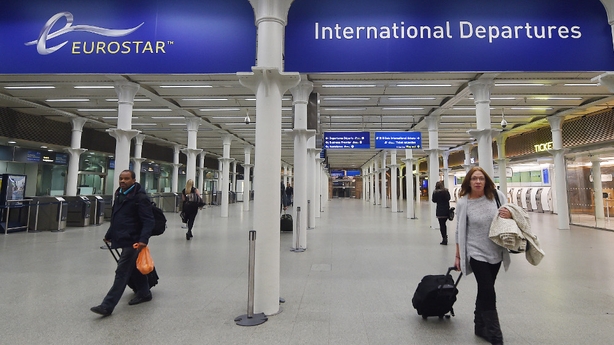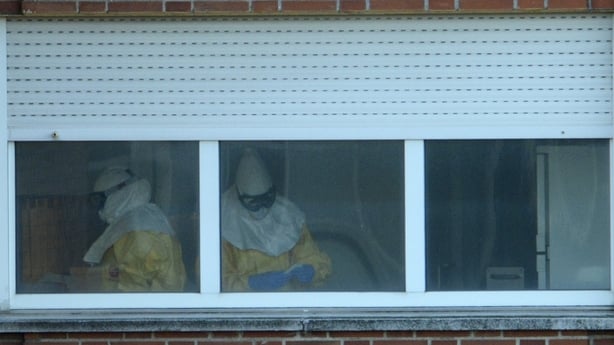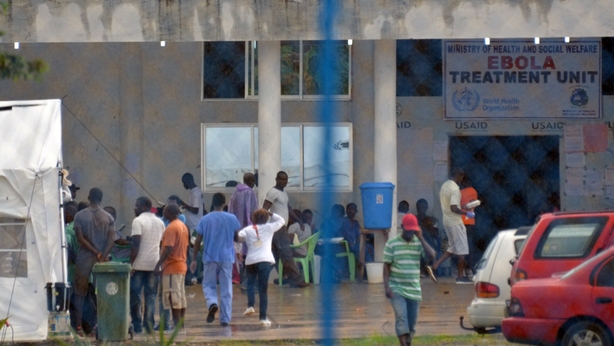Enhanced screening for Ebola will begin at Britain's biggest airport tomorrow with checks at Heathrow’s Terminal 1.
The screening will then be expanded to cover Gatwick airport and Eurostar rail terminals by the end of next week.

UK Health Secretary Jeremy Hunt told the House of Commons that it was "likely" that Ebola will be seen in the UK and a "handful" of cases could be confirmed in the next three months.
The United States and Canada have also begun new screening measures at major airport hubs to check travellers for symptoms of the deadly disease, and pressure has grown for other nations to follow their lead.
A spokesperson for the Department of Health has said Ireland has no plans to introduce Ebola screening at the Irish airports.
European Union health ministers are to meet on Thursday to discuss the possible screening of travellers from Ebola-hit west African countries.
The talks are designed "to coordinate the actions of member states" in the absence of any agreement on whether to monitor travellers to Europe, the officials said.
"The idea is for member states to discuss screening upon arrival in the European Union," European Commission health spokesman Frederic Vincent told reporters.
He said the meeting would focus on coordinating efforts since any introduction of screening at airports and train stations would be a sovereign decision by a member state.
A European source said the discussion will also touch on "the effectiveness of screening procedures on departure from the affected countries".
The goal is to also "reassure Europeans" at a time when the infection of a Spanish nurse last week in Madrid raised concerns throughout Europe, the source added.
Fewer than half a dozen member states, including France and Belgium, have direct air links with high-risk areas of west Africa.
The World Health Organization has so far not recommended screening travellers from Ebola-hit countries, which carry it out themselves, usually by having officials take the temperatures of travellers.
Meanwhile, Spain will be free from the threat of further contagion from Ebola on 27 October if all those who had close contact with infected nurse Teresa Romero remain without symptoms by then, according to a hospital director.

Concerns over the possible spread of Ebola have been high in Spain since Ms Romero contracted the disease on 6 October, becoming the first person diagnosed with catching Ebola outside of Africa.
Elsewhere, healthcare workers in Liberia, the country hit hardest by the Ebola epidemic, are to go on strike to demand hazard pay for treating patients infected with the deadly disease.
"We will be on a nationwide strike in every hospital and every health centre including ETUs (Ebola Treatment Units)," said Joseph Tamba, chairman of the health workers' union.
Staff at Monrovia's Island Clinic, the largest government-run Ebola clinic in the capital, have already been on a "go slow" in their battle for extra pay.
Health officials had requested they avoid industrial action during the Ebola crisis, which has killed more than 4,000 people in west Africa.
More than 2,300 people have died from the virus in Liberia.
Dozens of patients in the clinic have died from Ebola since the go-slow began on Friday, said staff representative Alphonso Wesseh.
"We have slowed down our activities because the government refuses to satisfy our request. Last night tens of patients died," he said.
Government spokesman Isaac Jackson on Friday denied there was any disruption at the Island clinic opened by the World Health Organisation in late September to combat the virus.
It was impossible, however, for journalists to independently verify the claim, as Liberia banned reporters from entering Ebola clinics on Friday, arguing it was to protect patients' privacy.
Healthcare workers have been particularly affected by the current Ebola outbreak, which spreads through contact with bodily fluids.

In Liberia alone, 95 healthcare workers have died from the tropical fever, out of 201 infected, according to the latest WHO figures.
Addressing a meeting on Ebola organised by the World Bank on Thursday, Liberian President Ellen Johnson Sirleaf said support should include "compensation to healthcare workers who, for fear of the risk involved, have refused or are reluctant to return to work".
Yesterday, the US Centers for Disease Control and Prevention confirmed that a Texas health care worker had tested positive for Ebola, the first case contracted on US soil.
Nina Pham, a nurse who treated Thomas Eric Duncan, the Liberian man who died in Dallas last week, is the first person to contact the virus on US soil.
US officials have said Ms Pham's dog will not be put down in contrast to what happened with the dog of the Ms Romero in Spain last week.
Dallas mayor Mike Rawlings said the dog is very important to Ms Pham and "we want it to be safe".
On Wednesday, Spanish officials put down Excalibur, the pet dog of Ms Romero to "avoid suffering", a move which sparked protests from animal rights groups.
Experts say there is a risk that canines may carry the deadly virus, but no evidence that they could infect humans.
Emergency crews in protective gear removed five passengers with flu-like symptoms from an plane at Boston's Logan Airport tonight, a spokesman for the Massachusetts Port Authority said.
The Emirates flight 237 was from Dubai, and none of the ill passengers had recently been to west Africa, said spokesman Matthew Brelis.
The region is in the midst of a deadly Ebola outbreak.
"Out of an abundance of caution, the people were wearing protective gear when they went on board the plane and removed the passengers," Mr Brelis said.
He was not immediately able to provide further details.
Meanwhile, a man in Massachusetts, who was being evaluated at a Boston hospital for a possible Ebola infection, does not appear to have the deadly disease, officials at Beth Israel Deaconess Medical Center said last night.
Call for clear training in Ireland to deal with Ebola
The Department of Foreign Affairs has been advising non-governmental organisations about what precautions aid workers returning from areas infected with the Ebola virus need to take.
Unions representing health workers have also called for a clear plan and training to make sure Ireland is prepared if an outbreak occurs.
Dr Darina O'Flanagan, the director of the Health Protection Surveillance Centre, said checks were taking place to ensure nurses and doctors at all hospitals had adequate training.
Speaking on RTÉ's Morning Ireland, she said she believed Ireland is well prepared for the possibility of an outbreak.
She said: "We have a national isolation unit in the Mater [Hospital], we have guidance for general practitioners and hospitals if a case presents itself.
"Of course this is an evolving situation and we constantly review what is happening in west Africa and other countries, such as the United States and Spain, to examine the situation and see if we should amend or alter or guidance."

